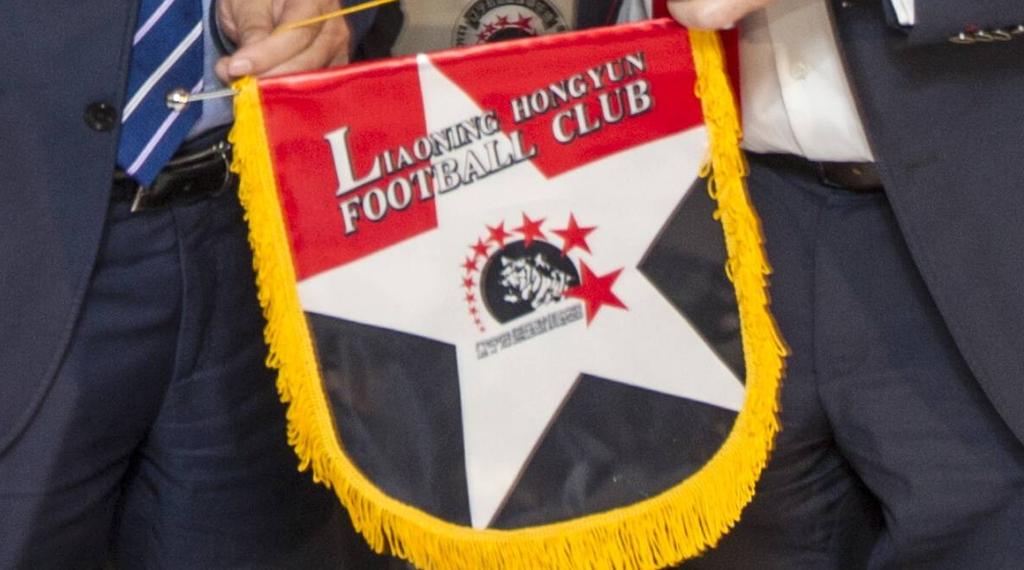'The club is dead' - footballers unpaid and angry as Chinese teams fold

The team bus of Liaoning Hongyun will be auctioned to help pay its former players, but it will take much more than that to raise the $850,000 that Jacob Mulenga says he is owed.
The Zambian striker is not the only player trying to claw back unpaid wages from Chinese football clubs that have gone bust after a spate of frenzied investment fell flat.
Croatian midfielder Marko Basic is in the same predicament, as are other foreign and Chinese footballers. It is unclear how many.
Both allege that their signatures were forged to cover up the non-payment of their salaries. Both are angry.
Clubs failing to pay their players and going under is not new to Chinese football, but the problem hit a fresh low with the collapse of Jiangsu FC in February -- barely 100 days after they won the Chinese Super League.
"I want to make it as public as possible, make it as big as possible. Until my money is paid, everyone has to be held responsible," Mulenga, who now plays in the Dutch second tier, told AFP by telephone.
"How are you going to explain $850,000 being owed to someone in his last years playing football?" asked the 37-year-old, addressing football's world governing body, FIFA.
"All you can say is: the club is dead, so we can't do anything," added Mulenga, who says he was not paid throughout his second season with Liaoning.
The former heavyweight club, Asian champions in 1990, disbanded in May last year.
"Meanwhile, the Chinese federation (football association) will go on... registering foreign players like nothing happened," said Mulenga.
FIFA did not respond to requests for comment.
Chinese league management authorities blame "a small number" of clubs and say it is a matter for courts and labour arbitration departments.
More than 20 clubs have been kicked out of China's professional leagues because of financial problems in the last two years, Xinhua news agency says.
Their demise left fans bereft and some players out of pocket, and raised doubts about President Xi Jinping's ambitions to make the world's most populous nation a leading football country.
It is also a warning to players considering moving to China, which attracted foreign stars such as 60-million-euro Oscar in 2017 but is now tightening its belt.
FIFPro, the global footballers' union, voiced concerns to the Chinese Football Association last year.
"Given a significant number of clubs which have been shutting down with barely any notice, we are concerned not only about the sustainability of professional football in China but the alarming lack of mechanisms in place to protect the livelihood of players," FIFPro told AFP.
The 32-year-old Basic says that Taizhou Yuanda, who were in China's second division last season, owe him two months' salary, or about $90,000.
The club abruptly closed in March after existing for only four years.
Like Mulenga, he alleges that the club forged players' signatures on documents stating they had been paid, so they could be cleared to play by the CFA.
"They faked our signatures and just applied for the registration," Basic, who did not wish to divulge his story before leaving China, told AFP from his home in Switzerland.
"They faked maybe 15 signatures to say that we got all the salaries."
Basic, who says part of his wages were paid in cash, wrote to the CFA in January but had no response.
Helena Zhang, a Shanghai lawyer, said that it is theoretically possible to sue owners of bankrupt and liquidated clubs when the owners' investment is fraudulent, however players' chances of success in a Chinese court -- if the case gets that far -- are very slim.
China wants to win a World Cup by 2050 but Basic fears that will not happen "in 100 years" without changes to how the game in the country is run.
Even though a new salary cap and other CFA measures have put a dampener on spending, Basic said: "They didn't spend the money in an intelligent way to develop Chinese football."
Mulenga and Basic both stressed that there are good people involved in Chinese football and well-run clubs, but players thinking of moving to the country need to be careful.
"Nobody is guaranteed to get their money," said Basic, highlighting the demise of champions Jiangsu.
"If it can happen to them, it can happen to every club in China."





